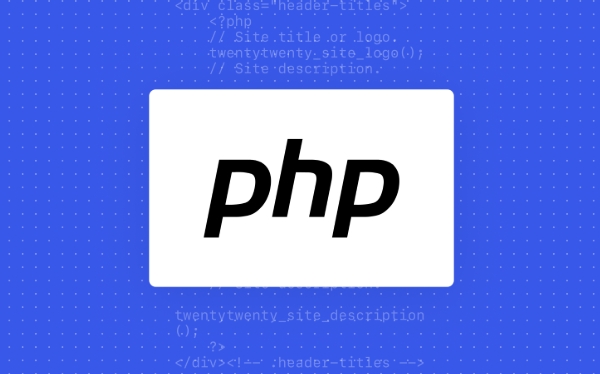Mastering the Nuances of PHP Block Commenting
Jul 26, 2025 am 09:42 AMPHP block commenting is essential for documenting logic, disabling code, and creating structured docblocks; 1. Use / / for multi-line comments but avoid nesting, as it causes parse errors; 2. You can safely include // comments inside / / blocks; 3. Always close block comments with / to prevent unintended code exclusion; 4. Use / / DocBlocks for public APIs to enable IDE support and tooling integration with @param, @return, and @throws annotations; 5. Keep comments meaningful, update outdated ones, explain intent over mechanics, and avoid leaving large commented-out code sections in production—use version control instead; proper block commenting enhances readability, maintainability, and team collaboration, making it a vital practice in professional PHP development.

PHP block commenting might seem straightforward, but mastering its nuances can significantly improve code readability, maintainability, and collaboration—especially in larger projects. While // and # handle single-line comments, block comments using /* ... */ serve a different purpose: documenting logic, temporarily disabling code sections, or writing structured docblocks for tools like PHPDoc. Let’s break down the practical and often overlooked aspects of PHP block commenting.

When and Why to Use Block Comments
Block comments are ideal when you need to:
- Comment out multiple lines of code during debugging.
- Write detailed explanations for complex logic.
- Create structured documentation using PHPDoc standards.
- Preserve temporary notes that span several lines.
Unlike single-line comments, block comments don’t require prefixing each line with //, making them cleaner for longer annotations.

/*
This function calculates compound interest
but only applies it to verified accounts.
Pending further review with the finance team.
*/
function calculateInterest($principal, $rate, $time) {
// ... logic here
}?? Note: Avoid using
/* */inside expressions or strings—it can break syntax if nested or improperly closed.
Proper Syntax and Common Pitfalls
The basic syntax is simple:

/* This is a valid multi-line comment */
But there are traps:
1. No Nesting
You cannot nest /* */ comments. This will cause a parse error:
/*
/*
This breaks!
*/
*/Instead, use single-line comments within block comments if needed, or refactor.
2. Use // Inside /* */? Yes!
Even within a /* */ block, you can include // without issue:
/* Planning to refactor: // Old method: calculateLegacyRate() // Now using: calculateRevisedRate() Will update after testing. */
This is safe because // is ignored once inside the block.
3. *Don’t Forget the Closing `/`**
An unclosed block comment will comment out everything until the next */—possibly hundreds of lines down. This can lead to mysterious "disappearing" code.
Using Block Comments for PHPDoc (DocBlocks)
One of the most powerful uses of block comments is writing DocBlocks—structured comments that document classes, methods, and properties. These are parsed by IDEs and tools like PHPStan or Laminas Code.
/**
* Represents a user in the system.
*
* @package App\Models
* @author Jane Doe <jane@example.com>
*/
class User
{
/**
* Calculate monthly subscription cost.
*
* @param int $months Number of months to bill
* @param bool $isPremium Whether user has premium access
* @return float Total cost after discount
* @throws InvalidArgumentException If months is less than 1
*/
public function getSubscriptionCost($months, $isPremium)
{
if ($months < 1) {
throw new InvalidArgumentException("Months must be at least 1.");
}
// ... logic
}
}Key points:
- Start with
/**(two asterisks) for DocBlocks. - Use
@param,@return,@throws, etc., for clarity. - IDEs use this to provide auto-completion and type hints.
Best Practices for Clean, Useful Block Comments
-
Be concise but meaningful. Avoid obvious statements like
/* start loop */. - Update or remove outdated comments. A stale comment is worse than no comment.
- Use block comments for intent, not just mechanics. Explain why, not what.
- Prefer DocBlocks for public APIs. They integrate well with tooling.
- Avoid large commented-out code blocks in production. Use version control instead.
? Tip: If you’re commenting out code for more than a few hours, commit it to a feature branch. Leaving dead code in files confuses teammates.
Basically, PHP block commenting is more than just hiding code—it's a tool for communication. Whether you're documenting a complex algorithm or writing machine-readable PHPDoc, getting the details right helps everyone (including future you). Just remember: no nesting, always close, and keep it relevant.
The above is the detailed content of Mastering the Nuances of PHP Block Commenting. For more information, please follow other related articles on the PHP Chinese website!

Hot AI Tools

Undress AI Tool
Undress images for free

Undresser.AI Undress
AI-powered app for creating realistic nude photos

AI Clothes Remover
Online AI tool for removing clothes from photos.

Clothoff.io
AI clothes remover

Video Face Swap
Swap faces in any video effortlessly with our completely free AI face swap tool!

Hot Article

Hot Tools

Notepad++7.3.1
Easy-to-use and free code editor

SublimeText3 Chinese version
Chinese version, very easy to use

Zend Studio 13.0.1
Powerful PHP integrated development environment

Dreamweaver CS6
Visual web development tools

SublimeText3 Mac version
God-level code editing software (SublimeText3)

Hot Topics
 The Perils of Nested Multiline Comments in PHP
Jul 26, 2025 am 09:53 AM
The Perils of Nested Multiline Comments in PHP
Jul 26, 2025 am 09:53 AM
PHPdoesnotsupportnestedmultilinecomments,andattemptingtonestthemcancauseunexpectedcodeexecutionorparseerrors;thefirst/closestheentirecommentblock,soanycodefollowingit—evenifintendedtobecommented—willbeexecuted,leadingtobugsorfatalerrorswhenfunctionsa
 Writing Clean File Headers: A Standardized Approach with Multiline Comments
Jul 25, 2025 am 11:13 AM
Writing Clean File Headers: A Standardized Approach with Multiline Comments
Jul 25, 2025 am 11:13 AM
Awell-structuredfileheaderimprovescodereadabilityandcollaborationbyprovidingkeyfileinformationupfront.1.Includethefile’spurpose,author,creationandmodificationdates,version,license,dependencies,andoptionalnotes.2.Useaconsistentmultilinecommentformatli
 Multiline vs. Single-Line Comments: A Strategic Guide for PHP Developers
Jul 27, 2025 am 04:33 AM
Multiline vs. Single-Line Comments: A Strategic Guide for PHP Developers
Jul 27, 2025 am 04:33 AM
Single-line comments (//) are suitable for short, local instructions or debugging, 1. Use // for in-line comments or temporarily disable code; 2. Use // for multi-line comments to provide detailed descriptions of complex logic or comment large pieces of code; 3. Use /*/ to write PHPDoc to implement structured documents and integrate with the IDE; 4. Avoid comments to be obvious code; 5. Always keep comments updated to ensure comments clearly convey intentions rather than just describe operations, thereby improving code maintainability.
 Leveraging PHPDoc Blocks for Superior Code Maintainability
Jul 24, 2025 pm 10:25 PM
Leveraging PHPDoc Blocks for Superior Code Maintainability
Jul 24, 2025 pm 10:25 PM
PHPDocsignificantlyenhancesPHPcodemaintainabilityandclarity.1.Itprovidestypeclarityevenwithoutstricttyping,documentingparameters,returnvalues,andpropertieswithprecision.2.Itdescribescomplexreturntypeslikestructuredarrays,nullablevalues,anduniontypes,
 How Modern IDEs Transform PHP Comments into Navigational Tools
Jul 25, 2025 am 04:43 AM
How Modern IDEs Transform PHP Comments into Navigational Tools
Jul 25, 2025 am 04:43 AM
PHPDoccommentsprovidetypehints,enableautocomplete,detecterrors,andsupportnavigationinIDEsbyactingasstructuredmetadata.2.Specialinlinecommentslike//TODOor//FIXMEareparsedintoactionabletasks,allowingdeveloperstonavigate,filter,andtrackworkdirectlyfromt
 From Comments to Contracts: The Power of PHPDoc Annotations
Jul 25, 2025 am 04:41 AM
From Comments to Contracts: The Power of PHPDoc Annotations
Jul 25, 2025 am 04:41 AM
PHPDoccommentsarenotjustfordocumentation—theyserveasstructuredmetadatathatenhancecodereliabilityandmaintainability.1)TheyprovidetypehintsbeyondPHP’snativesyntax,allowingprecisedefinitionslikearrayornullabletypes,whichtoolslikePHPStanuseforstaticanaly
 Mastering the Nuances of PHP Block Commenting
Jul 26, 2025 am 09:42 AM
Mastering the Nuances of PHP Block Commenting
Jul 26, 2025 am 09:42 AM
PHPblockcommentingisessentialfordocumentinglogic,disablingcode,andcreatingstructureddocblocks;1.Use//formulti-linecommentsbutavoidnesting,asitcausesparseerrors;2.Youcansafelyinclude//commentsinside//blocks;3.Alwayscloseblockcommentswith/topreventunin
 The Unsung Hero: Enhancing Code Clarity with PHP Multiline Blocks
Jul 25, 2025 pm 02:29 PM
The Unsung Hero: Enhancing Code Clarity with PHP Multiline Blocks
Jul 25, 2025 pm 02:29 PM
PHP's Heredoc and Nowdoc are effective tools to improve code readability and maintainability. 1. Heredoc supports variable interpolation, suitable for dynamic content such as HTML or JSON; 2. Nowdoc does not parse variables, suitable for plain text output; 3. Both avoid the confusion of quotation escapes and string splicing, making multi-line strings clearer; 4. When using it, make sure that the end identifier occupies one line and has no front and back spaces; 5. Direct insertion of untrusted data should be avoided to prevent security risks; 6. Code readability can be enhanced through unified naming separators (such as HTML, SQL). Reasonable use can significantly reduce cognitive load and improve development efficiency.






